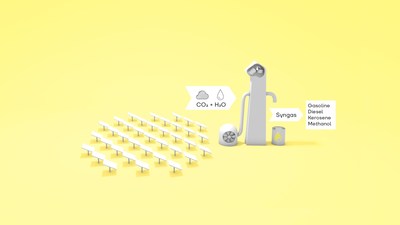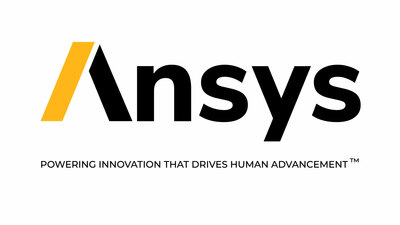Ansys Fuels Carbon-Free Transportation with Synhelion
Ansys has partnered with Synhelion to develop solar fuels, aiming to reduce CO2 emissions and replace fossil fuels. Utilizing Ansys' advanced simulation tools, Synhelion plans to build the world's first industrial-scale solar fuel plant in 2022. The company raised 16 million Swiss francs (approximately $17.5 million) for this initiative. Ansys' technology enables efficient design and production processes, enhancing the sustainability of transportation and industrial applications, including cleaner cement production through solar heat.
- Partnership with Synhelion to produce solar fuels supports sustainability goals.
- Plans to build the first industrial-scale solar fuel plant by 2022.
- Successful funding of 16 million Swiss francs enhances project viability.
- Ansys solutions improve design efficiency and reduce prototyping time.
- None.
PITTSBURGH, Dec. 15, 2021 /PRNewswire/ --
/ Key Highlights
- Synhelion utilizes Ansys solutions to enable sustainable transportation and reduce CO2 emissions by replacing fossil fuels with solar fuels
- Synhelion uses Ansys' multiphysics simulation through the Ansys Startup Program to overcome design challenges, predict future outcomes, and reduce prototyping time
- Synhelion will build the world's first plant capable of producing solar fuels at an industrial scale in 2022
Ansys (NASDAQ: ANSS) solutions are helping Synhelion steer toward cleaner transportation and net-zero emissions by helping to enable the development of solar fuels to replace fossil fuels. Synhelion became a member of the Ansys Startup Program in the beginning of 2020 when cooperation with the Swiss Elite Channel Partner CADFEM started. As global pioneer in the field of sustainable solar fuels, Synhelion uses Ansys' multiphysics simulation solutions and high-temperature solar heat to convert carbon dioxide (CO2) and water into synthetic fuels — such as solar gasoline, diesel, or jet fuel — that are compatible with conventional internal combustion engines and aircraft turbines.
To perform this conversion, mirrors reflect the sunlight and concentrate it directly onto a solar receiver where a heat-transfer fluid is heated to temperatures up to 1,500 degrees Celsius, or 2,732 degrees Fahrenheit. This solar heat is then used to drive the thermochemical reactor that produces sustainable fuel. Synhelion leverages Ansys' computational fluid dynamics (CFD) and finite element analysis (FEA) software entrusting Ansys® Fluent® and Ansys® Mechanical™ to understand the complex flow and replicate thermo-fluid dynamics to design and validate capable equipment, despite scorching temperatures. With Ansys' best-in-class simulation tools, Synhelion can overcome design challenges, predict future outcomes, and reduce prototyping time. The resulting solar fuel solves various challenges, including being cleaner, more economic, easier to transport, and able to be stored indefinitely.
"Ansys' CFD and FEA simulation allows us to develop, test, and validate extremely complex technology to create sustainable solar fuels," said Lukas Geissbühler, Head Thermal Systems at Synhelion. "Particularly, in developing our solar receiver, we needed sophisticated and predictively accurate software and Ansys delivered. Thanks to Ansys' software, we could reduce prototyping time and build our first industrial receiver more quickly."
By using concentrated solar energy directly in a thermochemical process, Synhelion can utilize
"Ansys is passionate about creating a sustainable future from road infrastructure to aviation and everything in between," said Shane Emswiler, senior vice president of products at Ansys. "By helping to enable a solution for sustainable fuels, we are driving sustainable innovation forward on the ground and in the air, addressing climate change challenges, and moving toward a cleaner future."
Synhelion recently raised 16 million Swiss francs (about
/ About Synhelion
Synhelion is a global pioneer in the field of sustainable solar fuels. The clean energy company evolved from the Swiss Federal Institute of Technology (ETH Zurich) in 2016 to decarbonize transportation. Solar fuels can replace all types of fossil fuels as they are economically viable and fully compatible with existing global infrastructure. Synhelion's unique technology converts concentrated solar heat into the hottest existing process heat on the market, making it possible to drive an unprecedented number of industrial processes such as fuel production and cement manufacturing with solar heat. The company already works with international partners such as Lufthansa Group, Wood, Eni, CEMEX, and Zurich Airport. For more information, please visit: www.synhelion.com
/ About Ansys
If you've ever seen a rocket launch, flown on an airplane, driven a car, used a computer, touched a mobile device, crossed a bridge, or put on wearable technology, chances are you've used a product where Ansys software played a critical role in its creation. Ansys is the global leader in engineering simulation. Through our strategy of Pervasive Engineering Simulation, we help the world's most innovative companies deliver radically better products to their customers. By offering the best and broadest portfolio of engineering simulation software, we help them solve the most complex design challenges and create products limited only by imagination. Founded in 1970, Ansys is headquartered south of Pittsburgh, Pennsylvania, U.S.A. Visit www.ansys.com for more information.
Ansys and any and all ANSYS, Inc. brand, product, service and feature names, logos and slogans are registered trademarks or trademarks of ANSYS, Inc. or its subsidiaries in the United States or other countries. All other brand, product, service and feature names or trademarks are the property of their respective owners.
ANSS–C
/ Contacts | |
Media | Mary Kate Joyce |
724.820.4368 | |
Investors | Kelsey DeBriyn |
724.820.3927 | |
![]() View original content to download multimedia:https://www.prnewswire.com/news-releases/ansys-fuels-carbon-free-transportation-with-synhelion-301445012.html
View original content to download multimedia:https://www.prnewswire.com/news-releases/ansys-fuels-carbon-free-transportation-with-synhelion-301445012.html
SOURCE Ansys
FAQ
What is the partnership between Ansys and Synhelion about?
When will Synhelion build its solar fuels plant?
How much funding did Synhelion raise?
What technology does Ansys provide to Synhelion?









